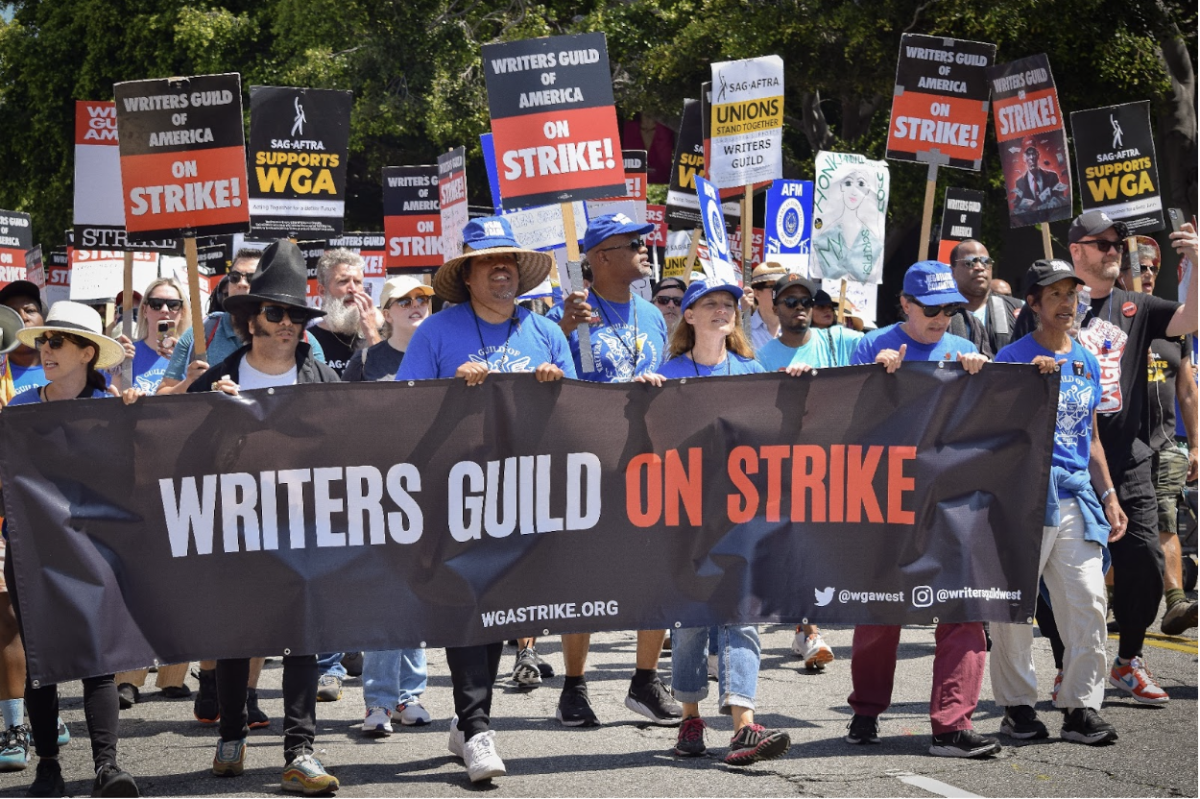The Writers Guild of America (WGA) strike officially came to a close on Sept. 27 after 148 days of stopped labor, securing its spot as the second longest writers strike in Hollywood history. The union’s membership voting took place on Oct. 2. Despite the WGA’s victory, the SAG-AFTRA Union, which represents actors, is still striking for the foreseeable future.
The WGA strike’s effects trickled down to Staples life, as reruns became more frequent and Netflix grew stale. However, the strike’s aftermath might be seen more intensely. The production of shows and movies will continue to be held off as even though writers are slowly returning to work, so far the actors under SAG-AFTRA refuse to follow suit.
“Business will be drastically different than it was before [the strike],” talent manager and producer Jodi Schoenbrun Carter said. “There will be a lot less television shows, which has to do with the business as it stands, [and] there will not be new episodes of T.V. until February or March. A lot of broadcasts that were planned to have 20 plus episodes will now have around 12 or 13. Unfortunately, there will be a lot less new content for a little bit longer.”
The impact of the strike was first seen at the level of the writers, as they slowly began losing their houses or other valuables due to lack of income. Slowly, the auditions and projects for actors also started drying up, chipping at their income as well and impacting the practice for student actors.
“As an actor, I’ve definitely noticed a change since the strike began,” Grace Power ’24 said. “The lack of projects being written has caused… a significant decrease in auditions available. However, it’s all worth it so industry professionals can be properly compensated for their hard work.”
The last Hollywood writers’ strike was 15 years ago and resulted in pressuring the lesser-paid artists to submit to a deal. This time, the WGA agreed to stick together until all their demands were met, which was powerful but derailed industry productions for nearly five months.
The contract ending the strike will increase writers’ minimum wage and compensation, improve terms for length of employment and size of writing teams, and will provide better residuals for the writers. The specific reasons for the strike can help Staples students to understand why their favorite shows are being suspended or canceled all together. This can be broken down into three categories: The first is the change of the mold of television in the last 10-15 years as it transitioned from cable-dominant to streaming. The WGA strike, and additionally the SAG-AFTRA strike, have been predominantly surrounding this instability in the industry.
“Most of your readers probably look at movies and tv shows on their phones, iPads or computers,” Schoenbrun Carter said. “The distribution of creative work through the internet has created a huge shift in how things are produced, and more importantly, how things make money. The business was already so different because cost cutting was initiated due to the shows not really being profitable for anyone except Netflix.”
The second motive for the strikes was the lack of training opportunities for writers. This greatly impacts any future screenplay writers who might graduate from Staples, such as Golden Globe nominee Liz Hannah who wrote the 2017 film “The Post.” Essentially, many novice writers were not able to sit in what are called “writers rooms,” which allow them to understand the process of curating and working on a running television show. There were 599 new television shows in 2022 alone, but there was a lot less work and opportunity for new writers. According to Vox news, the WGA was pleased with the adaptations to this issue in their new contract.
“We can say, with great pride, that this deal is exceptional — with meaningful gains and protections for writers in every sector of the membership,” WGA said.
The last major section of the contract and strike was in regards to AI development and its infiltration of the industry. Just as AI technology rapidly invaded student life and work, the new technology proposes major issues for the authenticity and point of the industry: an artform curated by humans for the entertainment of others. With robotics involved, the writing loses its humanity. Companies are training the AI by feeding it thousands of episodes from previous writers’ work.
“It would be like taking all the episodes from ‘The Office,’ ‘Friends’ and ‘Grey’s Anatomy’ and shoving them into the AI machine and telling ChatGPT to write you a sitcom that’s sort of a mix of the three,” Schoenbrun Carter said, “and then using that material to actually make it. The concerns were not only training the AI, but what if the AI is used to replace the writers?”
The strike’s impact was felt beyond the WGA’s 11,500 members. It was seen nationally as shows began to delay the production of upcoming seasons or canceled projects in their entirety. Teenagers and adults alike have resorted to stale reruns, and the lineup for the fall consists mostly of reality television or game-shows.
“[The strikes have] halted production on TV shows or movies that I was excited about,” Power said. “Now that the writer’s strike is over, I’m really excited to start reading more scripts that come with auditions, as well as seeing projects that had production stalls.”
















































